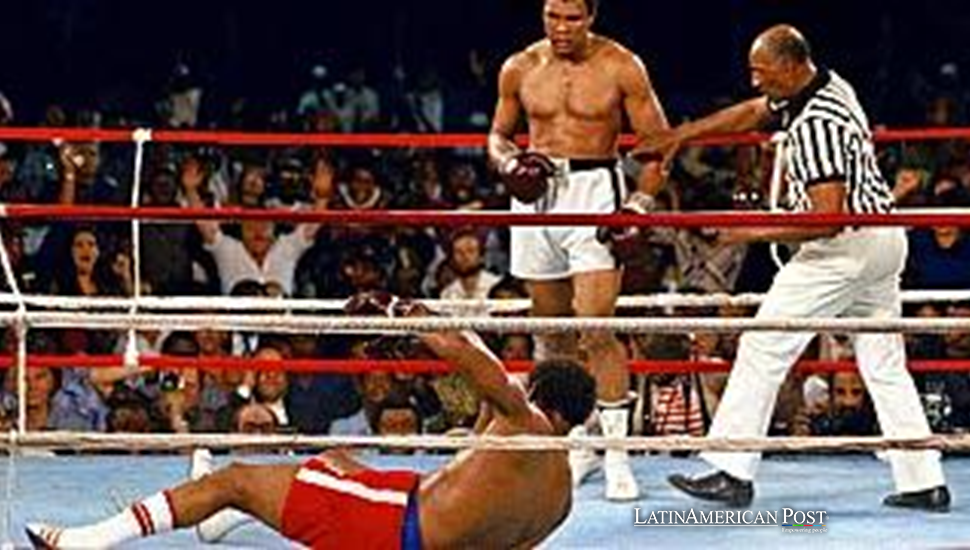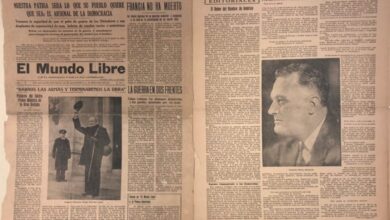Remembering the Fight that Taught Latin America How Sports Promote Cultural Richness

Fifty years ago, Muhammad Ali and George Foreman’s iconic 1974 fight in Zaire transcended boxing. It represented a reclamation of cultural dignity and strength, reminding the world that Africa, like Latin America, held a rich, “civilized” heritage that resisted colonial stereotypes.
Beyond “Banana Republics”: A Legacy of Rich Civilizations
The October 30, 1974, boxing match in Kinshasa, Zaire—known as “The Rumble in the Jungle”—was more than a sports event; it was a powerful symbol of anti-colonial resilience. For Muhammad Ali, fighting George Foreman in the heart of Africa was a statement about the dignity of a continent long misrepresented by colonial narratives. This event’s significance, especially in Latin American history, helps dismantle the “banana republic” stereotype that has plagued many post-colonial societies.
Latin America, like Africa, carries a rich and sophisticated pre-colonial heritage that colonial forces systematically diminished. Western narratives have often painted Latin America as a region needing “civilization” from foreign powers, dismissing the continent’s cultural achievements and resilience. However, the fight in Zaire reminds us that these societies were not cultural blanks but inheritors of advanced civilizations, from the Inca and Maya in Latin America to the great kingdoms of Mali and Ethiopia in Africa.
Ali faced Foreman, a powerful and aggressive fighter, by initially defying conventional tactics and attacking with unexpected right-hand leads. When this approach proved risky, Ali switched to his famous “rope-a-dope” strategy in the second round, leaning on the ropes and absorbing Foreman’s heavy blows to tire him out. Throughout the fight, Ali taunted Foreman, encouraging him to punch, which sapped Foreman’s energy as his relentless swings began to lose effectiveness. By the eighth round, Foreman was exhausted, and Ali capitalized with a series of precise punches, ending with a powerful right that sent Foreman to the canvas and sealed Ali’s victory.
This fight showcased Ali’s adaptability, resilience, and tactical brilliance. He absorbed Foreman’s power while strategically wearing him down. Although Foreman sought a rematch, he retired before it could happen, while Ali went on to defend his title against lesser opponents. The fight became legendary for Ali’s use of intelligence and stamina to overcome raw power, cementing his legacy in the boxing world.
Ali’s presence in Zaire was also significant because he embraced an identity rooted in pride for his African heritage, actively rejecting the stereotypes imposed by white supremacist ideals. This same pride can inspire Latin Americans to celebrate their ancestral roots, understanding that their heritage is not one of subjugation but of a complex, advanced, and storied civilization.
Reclaiming History in Kinshasa—and Latin America’s Parallel Struggle
The fight was steeped in a historical irony: it was held in Zaire, a country haunted by a brutal colonial past as the Belgian Congo, infamous for exploitation and human suffering under colonial rule. Despite his problematic legacy, Zaire’s leader, Mobutu Sese Seko, intended the event to spotlight African strength and autonomy in a world that often dismissed it. Similarly, Latin American leaders have frequently grappled with finding ways to showcase their nations’ strengths without succumbing to Western narratives that labeled them inferior or dependent.
Just as Zaire sought to project a modern image, Latin American countries have faced the challenge of building identities that balance modernization with respect for indigenous culture and historical resilience. From Colombia to Argentina, Latin America’s pre-colonial societies developed cities, agriculture, mathematics, and arts that Europeans often downplayed or erased. The ancient Inca terraces, Mayan architecture, and Aztec advances in mathematics and medicine rivaled their European counterparts. Yet, these achievements were often hidden behind labels that reduced these civilizations to mere ‘prehistory.’ Similarly, Ali’s fight in Kinshasa symbolized a rally against stereotypes that Africa was a land of ‘savages’—a perception that was historically used to justify colonial exploitation. The resilience of these societies, their ability to thrive despite such labels, is a testament to their strength and should inspire pride in their cultural heritage.
For Latin America, reclaiming historical narratives is not just essential but a crucial step in challenging the ‘banana republic’ stereotype that has cast it as a region solely defined by poverty, corruption, and underdevelopment. By embracing a legacy that includes the monumental achievements of the Aztecs, Maya, and Incas, Latin American societies can assert that their history is more than a colonial tragedy; it is a chronicle of innovation, resilience, and complex societal development.
Muhammad Ali as a Symbol of Cultural Strength
Ali was a formidable fighter in the ring. Still, outside of it, he was also a philosopher and advocate for Black pride and anti-colonialism. His journey from a patriotic Olympic gold medalist in 1960 to a symbol of Black nationalism and Pan-African pride represented a journey of cultural reclamation. This resonates with Latin American societies grappling with their colonial legacies. By refusing to fight in the Vietnam War and embracing his African identity, Ali sent a powerful message to the world that Blackness, and by extension any historically oppressed identity, was not a weakness but a source of profound pride.
In Latin America, this message finds strong parallels in the many leaders and activists who have worked to reclaim indigenous heritage and celebrate the region’s African roots. For instance, Afro-Latino communities across Colombia, Brazil, and the Caribbean embody the historical ties between Africa and Latin America, tracing back to the forced migration of enslaved Africans who brought invaluable cultural, religious, and social contributions. Like Ali’s journey, Latin America’s Afro-descendant populations underscore a resilience that has resisted erasure and cultural dilution. This robust celebration of Afro-Latin identity is a powerful recognition of the contributions and resilience of these communities, making them feel included and valued.
The symbolic victory in Kinshasa, where Ali’s intelligence and strategy prevailed over brute force, speaks to the idea that strength lies in unity and cultural pride. The fight reminds Latin Americans that dignity and civilization cannot be defined by Western metrics alone. Instead, it is rooted in a history that values the art, wisdom, and unity Latin American societies have sustained through centuries of external interference. This shared history and cultural pride create a sense of belonging and unity among Latin Americans.
Celebrating Heritage Beyond Colonial Narratives
The idea that Ali and Zaire challenged colonial perceptions of African nations as ‘savage’ or ‘undeveloped’ speaks to a broader resistance against the harmful myths of colonialism. Latin America, like Africa, has had to fight against reductive labels, such as ‘banana republic,’ which obscure the region’s complex and sophisticated histories. Latin American heritage is marked by cultural syncretism, a process where indigenous, African, and European influences have merged to create vibrant and diverse societies. This cultural syncretism is not a marker of weakness but a testament to resilience, as it has allowed Latin American societies to adapt and thrive in the face of external pressures.
In Latin America, reclaiming cultural pride has been a constant struggle against Western narratives that often label the region’s indigenous practices and beliefs as outdated or inferior. Indigenous rituals, sustainable agricultural practices, and community-based governance systems embody cultural wisdom that has survived centuries of colonial and post-colonial suppression. The fight in Zaire underscores that these histories deserve global respect, free from labels that imply underdevelopment or inferiority.
Ali’s famous rope-a-dope strategy used cleverness and patience to tire out his stronger opponent, which is a metaphor for Latin America’s endurance. Like Ali, who absorbed blows until he found the perfect moment to strike, Latin America has weathered centuries of exploitation, debt, and political meddling. Yet, it remains a region rich in culture and potential. Ali’s triumph echoes a call to Latin America to embrace and celebrate its cultural heritage, challenging any narrative that frames its identity as anything less than dignified and complex.
Resisting Modern Stereotypes and Embracing Cultural Identity
While the world may have forgotten the 50th anniversary of “The Rumble in the Jungle,” the fight’s themes remain as pertinent as ever. Ali’s victory was a triumph of physical strength, cultural pride, and strategic intelligence. This victory resonates with Latin America’s struggles against stereotypes that have historically painted the region as little more than a “backyard” to the world’s wealthier nations.
Latin America’s fight against stereotypes continues in both subtle and explicit ways. The influence of Afro-Latin music, food, dance, and the resurgence of Indigenous languages and customs illustrates a vibrant cultural identity that defies reductionist labels. Similarly, the recent push for social reforms that recognize the rights and contributions of indigenous and Afro-descendant populations shows a commitment to reclaiming and honoring this rich heritage. Just as Ali used his platform to change perceptions of Blackness globally, Latin American artists, activists, and leaders continue to reshape global perceptions of their culture and people.
Ali’s win in Zaire exemplifies a broader truth: cultural pride and resilience are powerful forces against systemic oppression. Latin America’s cultural journey parallels Ali’s in many ways, where resistance against colonial and racial stereotypes becomes a source of unity and pride. The fight in Kinshasa reminds us that true strength lies not in conforming to stereotypes but in transcending them, demonstrating that Latin America, like Africa, is far more prosperous than any “banana republic” label could imply. The ancestors of Latin Americans were architects, mathematicians, artists, and astronomers long before colonial powers entered their lands. The legacy of the ancient Incan, Mayan, and Aztec civilizations speaks to a grandeur that cannot be eclipsed by colonial condescension.
Also read: Latin American and Caribbean Stars Set to Shine in Baseball World Series
In celebrating its heritage, Latin America mirrors Ali’s legacy in the ring: a legacy of resilience, strategic patience, and triumph. Just as Ali stood as a beacon of Black excellence, Latin America’s multifaceted identity continues to shine, affirming that its value and history are much greater than any Western label could define.





